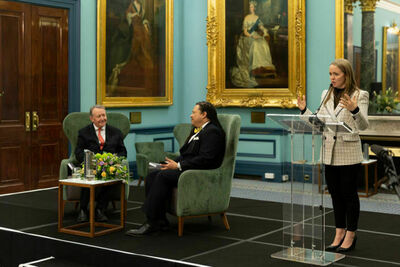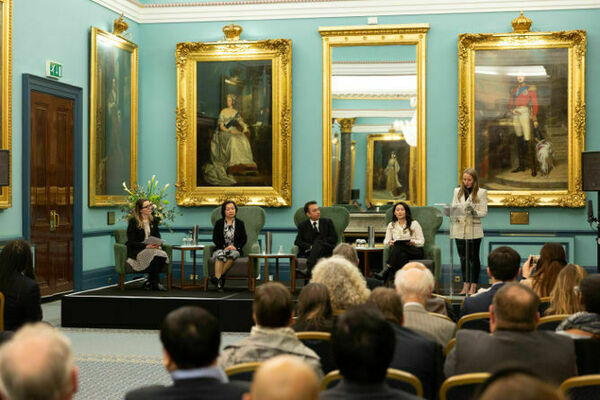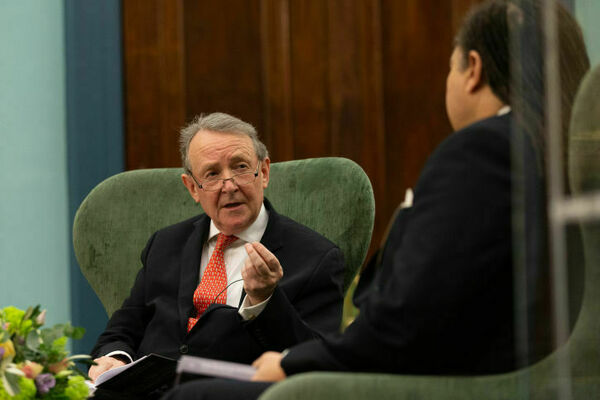London book launch with Lord David Alton explores need for international response to genocide

The Notre Dame Law School Religious Liberty Initiative hosted a book launch and discussion in London last month for Lord David Alton’s and Ewelina Ochab's recently published book, State Responses to Crimes of Genocide: What Went Wrong and How to Change It.
The event, organized by Professor Stephanie Barclay, director of the Religious Liberty Initiative, was held on March 14 at 116 Pall Mall in London. The evening included a fireside chat between Lord Alton, who is a member of the Religious Liberty Initiative’s board of advisors, and Notre Dame Law School Dean G. Marcus Cole, followed by a panel conversation which focused on broadening the themes of the book from the perspective of three distinguished panelists whose work centers on advocating for human rights. After the panel discussion, there was a reception and surprise birthday celebration for Lord Alton. The reception featured the artwork of British artist Hannah Thomas, displaying her series of portraits of women affected by genocide.
During the fireside chat, Lord Alton and Dean Cole delved into some of the complex topics discussed in State Responses to Crimes of Genocide. The book provides a comprehensive overview of the UK government’s approaches and response to genocide and includes firsthand insights into Parliamentary developments not otherwise publicly available. The underlying question that the book poses is what needs to change in order to ensure that, globally, people are better equipped to understand and prevent genocide in the future.
In their book, Alton and Ochab offer a thorough and extensive analysis of a wide array of genocides, including the Chinese government’s genocide of the Uyghurs, the Burmese military’s genocide of the Rohingya, the Daesh genocide against religious minorities in Syria and Iraq, and the genocide of Christians in Nigeria.
“If you treat the human dignity of every human being as unique and have no separation because of their color, their creed, their class, their orientation, their gender, their ability range — because each person is precious — then you have some chance, I think, in upholding human dignity, which is the other side of the coin from human rights. Those two things surely march hand in hand,” Lord Alton said.

Following the fireside chat, Ochab moderated a discussion featuring a panel of distinguished speakers who are committed to recognizing and amplifying the voices and human rights of forgotten minority communities. The panelists have been working with Lord Alton on a number of important issues regarding genocide and human rights violations.
“Dean Marcus Cole mentioned that, in this work, Lord Alton has many allies, and these are definitely the allies,” Ochab said while introducing the panelists.
The panelists included Homira May Rezai, chairwoman of the Hazara Committee in the UK and board member of the World Hazara Council; Professor Javaid Rehman, professor of law at Brunel University London and the UN Special Rapporteur on the Human Rights Situation in the Islamic Republic of Iran; and Rahima Mahmut, UK director of the World Uyghur Congress and executive director of Stop Uyghur Genocide.
Rezai kicked off the panel discussion by providing information about the Hazaras, an ethnoreligious group native to Afghanistan, and their forced displacement from Hazara-populated districts in the country.
She shared that the Hazaras have a long history of being persecuted in Afghanistan. Egregious violations continue to be carried out against the Hazaras today, including an increase in kidnapping, forced disappearances, and forced marriage — all of which are not being reported.
Mahmut observed that the extreme religious and ethnic persecution of the Hazaras is similar to the ongoing genocide of Uyghur Muslims in China’s Xinjiang region.
She spoke at length about the Uyghur genocide, providing detailed examples of the systemic violence against Uyghur children and women especially. Mahmut described the mass assimilation of Uyghurs as “the destruction of the culture, religion, and traditions” of Uyghur Muslims.
Rehman wrapped up the panel discussion and gave a detailed historical background on the first session of the United Nations General Assembly in 1946. At the session, there was a resolution adopted on the crime of genocide, and the General Assembly unanimously decided that genocide is a crime under international law and that people who commit genocide must be punished.
He also emphasized the value of universal jurisdiction, concluding that individuals who have committed serious crimes against humanity, including genocide, must be held accountable.

Throughout his career, Lord Alton has done tremendous work in addressing genocide and calling for the framing of more effective responses to crimes of genocide. Last year, he introduced a new Genocide Determination Bill in the House of Lords to compel the UK government to call out genocide where it exists, as well as to establish a framework by which the UK can meet its ongoing commitments to prevent genocide.
The Religious Liberty Initiative will present the Notre Dame Prize for Religious Liberty to Lord Alton at the upcoming Notre Dame Religious Liberty Summit in London this July.
About the Notre Dame Law School Religious Liberty Initiative
Established in 2020, the Notre Dame Law School Religious Liberty Initiative promotes and defends religious freedom for all people through advocacy, formation, and thought leadership. The initiative protects the freedom of individuals to hold religious beliefs as well as their right to exercise and express those beliefs and to live according to them.
The Religious Liberty Initiative has represented individuals and organizations from an array of faith traditions to defend the right to religious worship, to preserve sacred lands from destruction, to promote the freedom to select religious ministers, and to prevent discrimination against religious schools and families.
Learn more about the Religious Liberty Initiative at religiousliberty.nd.edu.
Originally published by at religiousliberty.nd.edu on April 28, 2023.